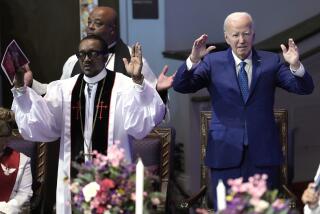Ministers Seek to Cut AIDS Toll Among Blacks
- Share via
Acknowledging the disproportionate impact of AIDS on African Americans, a coalition of ministers unveiled a plan Wednesday to enlist the power of the pulpit in the fight against the disease.
The goal of the effort--which is being carried out in partnership with the California Department of Health Services--is to encourage Christian ministers to inform congregations about HIV / AIDS prevention.
“None of us can do everything,” said Bishop Kenneth C. Ulmer, pastor of Faithful Central Missionary Baptist Church. “This problem is too massive, too complex. [But] all of us can do something. . . . There ought to be an intentional, deliberate inclusion of this issue.”
As part of that effort, the newly formed Statewide Church Advisory Board will create and distribute a ministry kit to teach religious leaders about the illness and provide suggestions on how to incorporate prevention messages in their sermons and in their work. Ulmer called for ministers to share sermon notes on the topic.
Nationwide, AIDS is the No. 1 killer of African American men and women between the ages of 25 and 44. According to a county report released this week, African Americans made up 9% of the county’s total population in 1997, but 23% of living AIDS cases.
Those figures have fueled a growing sense of urgency--one that is forcing the African American community to confront the illness in a different way than before.
“We must understand that this is . . . not a time for judgment,” said Bishop Charles E. Blake, pastor of West Angeles Church of God in Christ in the Crenshaw area. “This is not a time for condemnation. This is certainly not a time for politicking.”
African American ministers from throughout the city and state, along with county and state AIDS officials, gathered at West Angeles for a prayer breakfast and news conference on the effort.
Vanessa Baird, assistant chief of the state’s office of AIDS, said churches can play a key role in stemming the spread of the disease. The new advisory board will be responsible for the content of all materials, selecting messages they deem appropriate to reach African American Christian congregations. The state will underwrite the cost of producing the materials, provide technical help and assistance from public health officials, and help with promotion. The cost to the state probably will not exceed $40,000, Baird said.
“Many of the churches are already doing these kinds of activities without any type of assistance from the state,” she said. “We wanted to have something that was more comprehensive, more statewide and would capture more people’s attention.”
Churches have been criticized for being silent on the issue of HIV and AIDS, largely because in its early years it was identified as a disease primarily associated with gay men.
At Wednesday’s gathering, the advisory board faced questions on the idea, held by some churches, that AIDS is a plague from God to punish homosexuals.
“We certainly do not believe that is true,” Blake said. “It is a problem that can be explained scientifically.”
The goal of the advisory board is not to force theological arguments over homosexuality, but to agree on a strategy to teach people how to protect themselves from the virus. In addition to the minister’s kit, the group is encouraging churches to create HIV / AIDS ministries, and to devote at least four Sundays a year to talking about AIDS.
The advisory board’s appeal includes a call to “teach your congregations to be loving and compassionate toward those living with HIV / AIDS.”
The idea for a statewide advisory board grew out of an effort among some local churches to address the problem of HIV and AIDS.
Some people in the audience Wednesday asked why churches have waited so long to create such a coalition. Others simply welcomed the effort.
“Let’s just do it,” said the Rev. Alfreda Lanoix of Unity Fellowship Center, which has long taught AIDS prevention. “The thing that really angers me is that we should not even be in this position--15 years later.”
More to Read
Sign up for Essential California
The most important California stories and recommendations in your inbox every morning.
You may occasionally receive promotional content from the Los Angeles Times.













